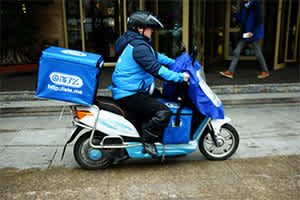Lime scooters are the least of pedestrian's concerns in China. Imagine a motorbike fully laden with grocery packages and hot meals for delivery hurtling towards you on the footpath at full speed. I don't have to imagine it, as I've spent much of the last week in Shanghai dodging these hardworking couriers while travelling between meetings. These scooters are on every street and corner, delivering meals and groceries non-stop throughout the day.
But it's not just pedestrians that have to watch out. While scooter base delivery has been a feature of Chinese life for decades is now, internet enabled food delivery apps and ecommerce mean that these scooters now have significant implications for retailers and ecommerce companies.

Many of the most successful ecommerce players globally (Amazon, JD.com, ASOS, Zalando etc) have operated a business model that requires lots of expensive warehouse infrastructure and emphasises delivery speed. These companies usually buy the goods themselves (electronics, apparel and beauty products), hold them in large warehouses, and then ship them via traditional couriers to your home. Often these parcels travel hundreds of miles and are costly to ship – particularly when speed is of the essence.
However, people buy significantly more goods online when delivery speeds up and is free, and to drive rapid growth these ecommerce companies have had to promise faster delivery and build distribution facilities closer to customers. Instead of just having one warehouse in the centre of the US (or in Auckland), they may build one in each major city. This makes growth very expensive and capital intensive.
Now to introduce our friends on scooters.
If I was sitting in central Shanghai and wanting a new mobile phone (Huawei, not the overpriced iPhone) I would probably open my JD.com app. JD is well known for offering the fastest ecommerce delivery in China. They can get me my new Huawei phone in about three hours – which is pretty phenomenal. However, there are dozens of electronics stores within two kilometres of central Shanghai, and by teaming up with local electronics chain Suning (like Noel Leeming), the Chinese ecommerce giant Alibaba can now have a new smartphone it in my hand within 30 minutes (courtesy of an Ele.me scooter delivery driver). While this transition is in its early stages, the value proposition is clear: Consumers get products faster; traditional retailers attract new customers at a time when many are struggling; and ecommerce companies can facilitate a sale without having to expand their distribution centres, buy more stock and build logistics networks.
As these developments bring speed and convenience, they have the potential to drive new areas of growth. If delivery was free and only took 30 minutes would you head to the shops less and order more online?
One category that people have been hesitant to buy online has been groceries — particularly fresh produce and meat. The traditional model where groceries are stored in a central warehouse and delivered the next day hasn't been popular with consumers. The scooter based deliver model has been changing this in China. If the produce comes from the local grocery store that you have gone to for years, and is delivered in less than 30 minutes, you will be more comfortable with the origin of the food and its freshness.
As a result, grocery chains in China are teaming up with ecommerce player Alibaba to allow customers to order groceries online and have them delivered by Ele.me. This also provides a great way for traditional retailers to harness the internet and get a slice of the rapidly growing ecommerce market.
While this has the makings of a powerful trend in China, the question will be if this trend can travel to the rest of the globe. Amazon is already toying with this with its free two-hour grocery delivery from its Whole Food stores in large US cities, and as we have seen in New Zealand recently with UberEats, companies are working on new ways of providing last mile delivery.
If this model can be exported to developed markets, then perhaps we'll have more than just Lime scooters to dodge in New Zealand before too long.
Picture: Ele.me deliver driver. One of the two large peer-to-peer delivery services in China.

